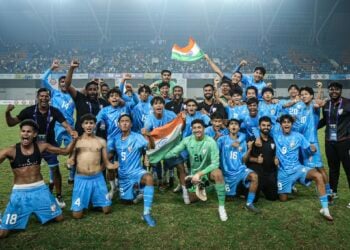In a dramatic turn of events that has ignited fresh optimism among Indian football enthusiasts, the Indian football team is set to make a last-minute entry into the prestigious CAFA Nations Cup 2025. This unexpected opportunity comes as Malaysia’s withdrawal opens the door for India to compete against some of Asia’s strongest football nations, marking a pivotal moment for the Blue Tigers’ international campaign.
Table of Contents
A Golden Opportunity Emerges from Malaysia’s Exit
The footballing landscape shifted dramatically when Malaysia announced their withdrawal from the CAFA Nations Cup 2025, scheduled to unfold across Uzbekistan and Tajikistan from August 29 to September 8. Malaysia’s head coach Peter Cklamovski cited the tournament’s timing outside the FIFA match window as the primary obstacle, creating complications with player availability that ultimately forced their hand.

This withdrawal created an unprecedented opportunity for the Indian football team, who now find themselves thrust into Group B alongside formidable opponents Iran, Afghanistan, and hosts Tajikistan. The final paperwork confirming India’s participation is expected to be completed within 24 to 48 hours, with sources close to the tournament organizers confirming that negotiations between the All India Football Federation (AIFF) and CAFA have reached their final stages.
The timing of this opportunity couldn’t be more crucial for Indian football. The Blue Tigers have endured a challenging period, managing only one victory since November 2023—a friendly triumph against the Maldives in March 2025 under former coach Manolo Marquez. This tournament represents a chance for redemption and rebuilding confidence ahead of critical upcoming fixtures.
Leadership Crisis and New Beginnings
The Indian football team currently finds itself in a state of transition, operating without a permanent head coach following Manolo Marquez’s resignation. The AIFF has identified three potential candidates to fill this crucial role: Stephen Constantine, who previously coached India, Khalid Jamil, and Stefan Tarkovic. Each brings unique credentials and experience, with the final decision expected to be announced within the week.

This coaching situation adds an extra layer of complexity to India’s CAFA Nations Cup preparation. Whoever assumes the role will face the immediate challenge of assembling and preparing a squad for high-stakes international competition with minimal preparation time. The tournament will essentially serve as their baptism by fire, testing their tactical acumen and man-management skills against seasoned opponents.
The recent coaching saga took an unexpected twist when the AIFF initially believed they had received applications from football legends Xavi Hernandez and Pep Guardiola. However, these applications were later confirmed to be fraudulent, highlighting the chaotic nature of the current situation while also demonstrating the global attention Indian football is attracting.
Tournament Structure and India’s Path Forward
| Group A | Group B |
|---|---|
| Uzbekistan (Host) | Tajikistan (Host) |
| Kyrgyzstan | Iran |
| Turkmenistan | Afghanistan |
| Oman | India |
The CAFA Nations Cup 2025 brings together the strongest teams from Central and South Asia, with India and Oman participating as honored guest nations. The tournament format ensures maximum competitive intensity, with group winners advancing to the final while second-placed teams compete for third place on September 8.
India’s preliminary schedule presents a fascinating narrative arc:
India’s CAFA Nations Cup 2025 Schedule:
- August 29: Tajikistan vs India (Opening Challenge)
- September 1: Iran vs India (Ultimate Test)
- September 4: Afghanistan vs India (Potential Decider)
- September 8: Final or Third-Place Match (If qualified)
Strategic Importance Beyond the Tournament
This tournament extends far beyond mere competitive football for the Indian football team. The CAFA Nations Cup serves as crucial preparation for India’s AFC Asian Cup 2027 qualifiers against Singapore in October, matches that could define the nation’s footballing trajectory for years to come.

India’s current position in Group C of the Asian Cup qualifiers is precarious. After drawing against Bangladesh and suffering a disappointing loss to Hong Kong, the Blue Tigers find themselves at the bottom of their group. With only one team qualifying from each group, the upcoming matches against Singapore have become do-or-die encounters where failure is not an option.
The CAFA tournament provides an invaluable opportunity to address tactical weaknesses, assess player combinations, and build the mental resilience required for high-pressure situations. The quality of opposition—particularly Iran, who consistently rank among Asia’s elite—will provide the perfect testing ground for India’s capabilities and ambitions.
Challenges and Opportunities in the Current Football Ecosystem
The broader Indian football ecosystem remains in flux, adding another dimension to the national team’s challenges. Uncertainty surrounding the Indian Super League (ISL) 2025-26 season, stemming from unresolved constitutional issues and pending agreements with FSDL, has created additional complications for player development and availability.
The AIFF plans to request extended training camps and early player releases from ISL clubs for both the CAFA tournament and subsequent AFC qualifiers. This approach reflects a growing recognition that success at the international level requires sustained preparation and professional support systems that align with global standards.
These systemic challenges, while concerning, also present opportunities for restructuring and improving Indian football’s organizational framework. The pressure of international competition often catalyzes positive changes, and the CAFA Nations Cup could serve as a catalyst for broader reforms within the sport’s administration.
Player Development and Squad Assessment
The tournament will provide India’s new coaching staff with an invaluable opportunity to assess the current player pool and identify talent capable of competing at the highest levels. The intensity and quality of opposition in the CAFA Nations Cup far exceed typical friendly matches, offering genuine insights into player capabilities under pressure.

Young talents who have emerged through the ISL and I-League systems will have the chance to prove themselves on an international stage, while experienced players can demonstrate their continued relevance to the national setup. This process of evaluation and selection will be crucial in building a cohesive squad capable of challenging for Asian Cup qualification.
The tournament also provides an opportunity to experiment with tactical systems and formations that could prove vital in future competitions. Facing varied playing styles from Iran’s technical excellence to Afghanistan’s physical approach will test India’s adaptability and tactical flexibility.
Building Momentum for Future Success
Beyond immediate tactical and personnel considerations, the CAFA Nations Cup represents an opportunity for the Indian football team to rebuild confidence and establish a winning mentality. The psychological impact of competitive international football cannot be understated, particularly for a team that has struggled for consistency in recent months.
Success in this tournament could provide the momentum needed to approach the crucial Singapore qualifiers with renewed confidence and belief. Conversely, poor performances could further undermine confidence and create additional pressure ahead of those make-or-break matches.
The tournament also offers a platform for Indian football to showcase its progress and potential to a broader Asian audience. Strong performances could enhance India’s reputation within the continental football community and potentially open doors for future tournament invitations and friendly matches against quality opposition.
The Indian football team’s unexpected entry into the CAFA Nations Cup 2025 represents both a significant opportunity and a considerable challenge. While the circumstances leading to this participation were beyond India’s control, the ability to seize this moment and use it as a springboard for future success will define the team’s immediate trajectory.
With a new coach set to take charge, crucial qualifiers on the horizon, and the broader football ecosystem in transition, the CAFA Nations Cup arrives at a pivotal moment for Indian football. The performances in Uzbekistan and Tajikistan could well determine whether this period is remembered as a low point from which Indian football recovered or a missed opportunity that defined a generation.
The stage is set, the opportunity is clear, and the expectations are building. Now, it’s time for the Indian football team to prove that they belong among Asia’s competitive nations and that their footballing ambitions extend far beyond mere participation.
Read More: Luis Diaz Set for Sensational €75m Bayern Munich Switch as Liverpool Star Forces Dream Move
FAQs
Why did Malaysia withdraw from the CAFA Nations Cup 2025?
Malaysia withdrew due to scheduling conflicts as the tournament takes place outside the official FIFA match window, creating player availability issues for their coach Peter Cklamovski.
Which teams will the Indian football team face in Group B?
India will compete against Iran, Afghanistan, and host nation Tajikistan in the group stage of the CAFA Nations Cup 2025.
Who are the candidates shortlisted for India’s head coach position?
The AIFF has shortlisted three candidates: Stephen Constantine (former India coach), Khalid Jamil, and Stefan Tarkovic for the vacant head coach role.
How important is this tournament for India’s Asian Cup qualification hopes?
The CAFA Nations Cup serves as crucial preparation for India’s AFC Asian Cup 2027 qualifiers against Singapore in October, which are essentially do-or-die matches given India’s current position at the bottom of Group C.
When and where will the CAFA Nations Cup 2025 take place?
The tournament will be held from August 29 to September 8, 2025, across venues in Uzbekistan and Tajikistan, with India’s matches likely taking place in Tajikistan as they’re in Group B with the host nation.








